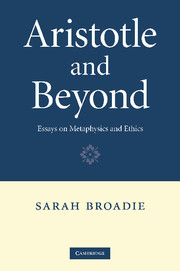Book contents
- Frontmatter
- Contents
- Preface
- Acknowledgments
- Chapter 1 Affecting and being affected
- Chapter 2 Backwards causation and continuing
- Chapter 3 From necessity to fate: An inevitable step?
- Chapter 4 Alternative world-histories
- Chapter 5 A contemporary look at Aristotle's changing Now
- Chapter 6 Nature and craft in Aristotelian teleology
- Chapter 7 Soul and body in Plato and Descartes
- Chapter 8 Aristotle and contemporary ethics
- Chapter 9 On the idea of the summum bonum
- Chapter 10 What should we mean by ‘the highest good’?
- Chapter 11 The good of practical beings: Aristotelian perspectives
- Chapter 12 Taking stock of leisure
- References
- Index of names
Chapter 11 - The good of practical beings: Aristotelian perspectives
Published online by Cambridge University Press: 25 June 2009
- Frontmatter
- Contents
- Preface
- Acknowledgments
- Chapter 1 Affecting and being affected
- Chapter 2 Backwards causation and continuing
- Chapter 3 From necessity to fate: An inevitable step?
- Chapter 4 Alternative world-histories
- Chapter 5 A contemporary look at Aristotle's changing Now
- Chapter 6 Nature and craft in Aristotelian teleology
- Chapter 7 Soul and body in Plato and Descartes
- Chapter 8 Aristotle and contemporary ethics
- Chapter 9 On the idea of the summum bonum
- Chapter 10 What should we mean by ‘the highest good’?
- Chapter 11 The good of practical beings: Aristotelian perspectives
- Chapter 12 Taking stock of leisure
- References
- Index of names
Summary
THE MAIN QUESTION
‘Which among humanly practicable goods is the summum bonum or highest good?’ is the first and central question of Aristotelian ethics. As we might expect, Aristotle's answer is rather abstract. Even so, he intends it to be informative and to provide guidance for policy-making and action. The present essay will focus on the account put forward in the Nicomachean Ethics, Book I, chapter 7, where Aristotle equates the highest human good with ‘the rational soul's activity of virtue in a complete life’. This compact formula sets an agenda that will explicate the highest good through detailed studies of (a) the virtues, and (b) the two most philosophically controversial components of a complete life, namely friendship and pleasure. Fully spelled out, the compact formula yields a conceptually rich, and substantial, ideal.
This essay will take the compact formula as given, and will not comment on the reasoning by which Aristotle arrives at it. Nor is it my present purpose to look closely at any portion of the content of his ideal. The main question addressed here is a formal one: what does it mean in the context of Aristotelian ethics to regard X as the highest good, whatever X may be? In discussing this question, we shall be led to consider the chief components of Aristotle's ideal to see how their interrelation constitutes a whole that fits the formal account of the highest good.
PERSPECTIVES ON PRACTICALITY
The claim that X is the highest good seems to imply that X is the good that we should strive above all to realise. But is that what the claim means?
- Type
- Chapter
- Information
- Aristotle and BeyondEssays on Metaphysics and Ethics, pp. 166 - 183Publisher: Cambridge University PressPrint publication year: 2007



